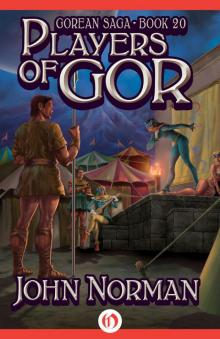- Home
- Norman, John;
Renegades of Gor Page 3
Renegades of Gor Read online
Page 3
The water in the moat, from the inpourings from the land about, the drainages, dark and roiling, was almost to the foot of the bridge.
The lantern to my right, to the side, on its post, at the right side of the bridge, swung wildly in the rain and wind.
I looked up. There was a blast of lightning. This illuminated starkly, for a moment, the palisade at the height of the plateau.
Lightning burst again across the sky.
The boards of the bridge were slick with water. It was about eight feet wide. Two wagons could not pass on it. It led upward to a covered gate, which, probably, had a covered, walled hall and another gate beyond it. The two gates, the inner and the outer, are seldom open at the same time. In the covered way, like an enclosed hall between the gates, there would doubtless, both above and to the sides, be arrow ports. Two massive ropes, better than eight inches in diameter, sloped down from the gate structure to the bridge, which allowed for the raising and lowering of a portion of it at will. When the section was raised, pulled up against the gate, further protecting it, the inn would be, in effect, sealed off, an island in its small sea. Such inns can serve as keeps or strongholds, but they seldom do so. For example, one can simply come to them, and buy entrance and lodging. In that sense they are open, though it is not unusual for them to be closed at night. They can, however, as I have suggested, serve as keeps. More than once such inns have served rural areas as a place of refuge from foragers or marauders. They have been seized, too, upon occasion by the remnants of defeated forces, as places in which to make desperate, perhaps last, stands. Too, such places, particularly in remote, restless or barbarous districts, may be used as outposts, strongholds from which a countryside may be pacified. Within the palisade there would be room for several wagons. In this place I did not know how many. Too, though I did not think it was now lit, there might be a sheltered tarn beacon somewhere, usually under a high shed. This signifies not only the location of the inn, and its amenities, but also a safe approach, one unimpeded by tarn wire, for a tarnsman, or a tarnsman with tarn basket. One brings the bird in to the left of the light, of course. By custom, as noted, Gorean traffic keeps to the left. We suggested earlier certain considerations, practical and lexical, which might bear on this practice.
There was a wagon to the left of the bridge. Its canvas cover was drawn down. The rain poured from it. Under the wagon there was a small, huddled figure, a tarpaulin clutched about its head and shoulders. Within the wagon, then, I supposed, there might be a fellow and his free companion. Doubtless, unless it had been displeasing in some way, the location of the small figure beneath the wagon, huddling there in misery and cold, was a consequence of the presence of the free companion within it. I did not doubt but what the small figure was far more beautiful and attractive than the free companion. That was suggested by what must be its status. Free women hate such individuals and lose few opportunities to make them suffer. I wondered if the fellow in the wagon had acquired the individual under it merely for his interest and pleasure, or perhaps, too, as a way of encouraging his companion to take her own relationship with him more seriously. Perhaps, if his plan worked, in such a case, he might then be kind enough to discard the individual beneath the wagon, ridding himself of it, its work accomplished, in some market or other. I crouched down. I could then see the heavy chain passed through the ring under the wagon. One end of it went between the folds of the tarpaulin clutched about the figure’s throat, probably to be padlocked there, about its throat, or attached to a collar. The other end went behind the figure and downward, probably to fasten together its crossed ankles. Seeing my eyes upon it, the small figure knelt under the wagon, and, its hands coming from the tarpaulin, their palms now on the gravel, put down its head, rendering obeisance.
“Oh!” she said, softly, as I lifted the tarpaulin back. She looked up from all fours. The chain which passed through the ring was wound twice about her neck, where it was padlocked. From her neck, through the ring, lifting, and thence descending, it served also to secure her ankles, which were, as I had anticipated, crossed and chained closely together. This makes it so that the prisoner cannot walk. It is common to chain female prisoners so that they cannot rise to their feet. In this there is not only a security but a symbolism, one that bespeaks their rightful place. Beneath the tarpaulin I saw that she was naked, and, as I had thought she might be, beautiful.
She looked up at me, from all fours. Her body now was streaked with the slanted rain. Her hair, apparently from before, was wet and very dark. It fell about her shoulders. Her knees were on the tarpaulin, within which she had huddled, over the gravel. I knelt her back, and then took her hands in mine. They were small, beautifully delicate and feminine. They were also cold. I rubbed them for a time. Then I put them on her thighs. I touched her body, gently, rubbing the rain about it. She shuddered, her shoulders and breasts wet now, and slick, with the rain.
“You are helpless,” I said to her, “and will make very little noise.”
“My ankles are chained,” she whispered.
I put her to her back, a bit more under the shelter of the wagon. The chain moved a little through the loop ring above us. I heard the wagon creak a little, too, above us. Someone had stirred in it, or was moving, it seemed. The fellow who owned the wagon, I supposed, was turning in his sleep, or was addressing himself to his companion. But it then seemed quiet, and there was little noise except for the wind and rain, and the distant rumble of thunder.
My face was close to hers. “You are slave,” I whispered.
Suddenly there was a great burst of lightning and crash of thunder.
I saw her eyes, and pressed down upon her, holding her head, raping her lips with the kiss of the master.
I drew back.
There was another great flash of lightning and I saw her eyes, looking up at me, wild, frightened, needful. “Yes,” she whispered intensely, helplessly, “I am a slave! I am a slave!” Then she lifted her body and seized me in her arms and pressed her lips eagerly, needfully, gratefully to mine.
I put her to her back.
Then I caressed her, and she squirmed, writhing on the wet tarpaulin over the gravel, beneath the wagon, in the flashes of lightning, in the explosions of thunder.
She was small, naked and cuddly. Her thigh, as I determined, in turning her about, and caressing her, first, by feel, and then in a flash of lightning, wore the common Kajira brand, the small, delicate “Kef,” for “Kajira,” sometimes called the staff and fronds, suggesting beauty subject to discipline. On her neck, beneath the coils of the heavy, padlocked chain, was a common, close-fitting Gorean slave collar.
“Alas,” she wept softly, in misery, in frustration, “my ankles are chained!”
I gathered she might not have been a slave long.
“Oh!” she cried, softly.
I thrust up her legs and slipped between them, and then her legs were tight about me, I within their chained circuit. I lifted her up, and lowered her. “Ohh,” she said, softly. She clutched me.
The storm was fierce.
Then, after a time, I lifted her up and slipped back, freeing myself.
There are various ways, of course, to use a woman whose ankles are bound. I had utilized one of them.
“If a question comes up,” I said to her, “you were warned to silence, and were helpless.” To be sure, this was even true. “You were merely utilized by a casual passer-by,” I said. Such things, incidentally, are not that unusual with female slaves, particularly if they are put out, without an iron belt, in effect for the taking. Slave rape, though it can be a civic nuisance, is at worse a peccadillo. There are few slave girls who have not experienced an occasional slave rape. After all, must they not expect such? Are they not slaves?
“I cannot believe the feelings I had,” she whispered.
“You must endure such feelings, and more,” I said, “when men choose to impose them upon you.”
“Yes, Master,” she whispered, in awe.
The extent and nature of such feelings, I think, are largely a function of the individuals involved. To be sure, they are usually, too, a function of many other factors, as well. For example, in this particular case, I suspected that her chaining might have been a factor. Restraining the female, sometimes symbolically, sometimes in fashions which are literally physically coercive, making her absolutely helpless, for various reasons, psychological and physical, intensifies her orgasm. This sort of thing, I suppose, is largely unknown to free women, though many seem to suspect it, dimly or otherwise. Its reality, of course, can become clear to them, for example, as they might find themselves on their knees, bound, kissing a man’s whip. The most significant restraint, of course, is the condition of bondage itself, in which the woman knows that the male is dominant over her and that she must submit to him, that she is owned, and must, in fear of very life, be obedient, and pleasing. Slavery institutionalizes, in an organized, social, civilized context, the natural biological relationship between men and women. It also, of course, as one would expect, by means of various devices, legal and otherwise, clarifies it and renders it more efficient.
“Oh, buy me, Master! Buy me!” she begged.
“Only a slave,” said I, “begs to be bought.”
“I am a slave,” she said. “That was taught to me weeks ago by the slaver who captured me!”
“You are probably not for sale,” I said.
“My master does not care for me,” she said. “He bought me only to anger his companion, who is terribly cruel to me. During the day, when my legs are open, he even rents me out to strangers for a tarsk bit!”
“Does his companion grow more attentive and concerned?” I asked.
“I think not,” she said.
“Perhaps it should be she who is chained beneath the wagon,” I said.
“She is a free woman!” protested the girl, in horror.
“Your master charges a tarsk bit for your use?” I asked.
“Yes,” she said.
“Open your mouth,” I said.
She did so, and I drew forth a tarsk bit from my pouch, this one not a separate coin in the sense of a round or square coin, but a piece of such a coin, a narrow, triangular, chopped eighth of a copper tarn disk, and placed it in her mouth.
“That is for your master,” I said. Many Goreans, particularly those of low caste, on errands and such, carry a coin or coins in their mouths. Most Gorean garments, a notable exception being those of artisans, lack pockets.
She looked at me.
I pulled the tarpaulin up about her, as it had been before, to protect her from the storm.
In placing the coin in her mouth, I had not only, having discovered he was interested in such things, and the price was not too much, compensated her master for her use but had precluded further importunities on her part.
I kissed a little at her face. I had thought the streaks there might have been rain, but they had a salty taste.
I moved from beneath the wagon and picked up my pack.
She looked up at me. She understood, the coin in her mouth, that she was now to be silent.
I looked up to the height of the stony plateau, and the palisade. In a flash of lightning, illuminated clearly for a moment, I could see, over the palisade, hanging from its chains, from the crosspiece on the high pole, swinging in the storm, the huge sign with its emblematic representation of a bird, that with the vulturelike neck and the distorted, grasping right leg and talons, the sign of the Crooked Tarn.
I looked back to the girl.
She was still looking at me.
I pointed to the gravel before her, under the wagon.
Immediately, kneeling, she lowered her head to the gravel, in obeisance.
I then turned away, and began to ascend the bridge, leading up to the gate. I put the girl from my mind. She was, after all, a slave, and her use had been paid for.
2
The Court;
Chained Women
“You are not a female,” said the voice from behind the door, a small, narrow door cut in the left panel of the gate, the eyes peering out from a small sliding hatch in the door. “Show that you have money!”
I lifted up a copper tarsk. The fellow inside lifted up a small tharlarion-oil lamp to the opening. I held the coin where he could see it but I did not put it through the aperture.
“Not enough!” he said.
I then held up a silver tarsk. The door opened.
I entered.
He locked the door behind me.
I then followed him through a high, shedlike tunnel, walled with wood, about forty feet long, to the interior gate. There he turned about. “Something for the porter,” he said.
“You are paid by the keeper of the house,” I said.
“Times are hard,” he said. “And it is late. I have opened the door late.”
“That is true,” I said. I put a tarsk bit into his hand.
“Times are hard,” he said.
I put down my pack. I took out a knife and pushed it a bit into his gut, pushing him back against the inner gate. He turned white. I lifted up his purse, on its strings, and, with the point of the knife, opened it. There were several coins within it. I could see in light of the small lamp he carried. “Times are not as hard as you thought,” I said. “How much would you like?” I asked.
“A tarsk bit is quite sufficient,” he said.
“You have it,” I said.
“Yes, Sir,” he said. “Thank you, Sir.” He put the tarsk bit from his hand into his purse, as I held it, and then took the purse gingerly from me, and, sensing he was permitted, dropped it, on its strings, so that again it hung from his belt, on his left. If one is right-handed, one normally lifts the purse with the left hand and reaches into it with the right. The weight of the purse, on its drawstrings, closed it.
“It is a violent night out,” I said.
“It is, Sir,” said he. “What have you heard from the north?”
“I have come from the south,” I said.
“Few go north now,” he said.
“Most here, I gather,” I said, “are from the north.”
“Yes,” said he, “and we are crowded beyond belief.”
“With folks from Ar’s Station?” I asked.
“Not many now,” he said. “Some managed to flee.”
“Most were trapped in the city?” I said.
“Apparently,” he said.
“What is your latest intelligence?” I asked.
“Little that is new,” he said.
“And what is old?” I asked.
“From whence have you come?” he asked.
“From the south,” I said. That I had come from Ar herself was no business of this fellow.
“Only what I hear,” he said, “—that the Cosians have invested Ar’s Station, on three sides by land, and have closed the harbor, that with a wall of chained rafts.”
“Have the walls been breached?” I asked.
“Several times,” said he, “but each time the defenders have managed to hold the breach, and repair the wall.”
I nodded. Some terribly bitter fighting takes place at such times. So, too, it can, in the streets themselves. “Cosians, as far as you know,” I said, “hold no part of the city itself.”
“Not as far as I know,” he said.
“What are the numbers involved, and your speculations as to the outcome?”
“It is you who wear the scarlet,” he said. “I am only a poor porter.”
“Surely you have heard things,” I said. I sheathed my knife. I sensed it might be making the fellow nervous.
“I have heard there are thousands of Cosians, their auxiliaries, and their mercenaries, at Ar’s Station,” he said. “If that is true, they must outnumber the regulars in Ar’s Station by as many as ten to one.”

 The Emperor
The Emperor Kajira of Gor
Kajira of Gor Players of Gor
Players of Gor Renegades of Gor
Renegades of Gor Blood Brothers of Gor
Blood Brothers of Gor Plunder of Gor
Plunder of Gor Mercenaries of Gor
Mercenaries of Gor Raiders of Gor
Raiders of Gor Gor 30 - Mariners of Gor
Gor 30 - Mariners of Gor Tribesmen of Gor
Tribesmen of Gor Magicians of Gor
Magicians of Gor Mariners of Gor
Mariners of Gor Assassin of Gor
Assassin of Gor Vagabonds of Gor
Vagabonds of Gor